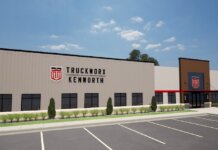
Installing sensors or running data analysis on vehicles under the blazing sun in the South can be taxing, as the students and researchers at Auburn University in Alabama can attest. But a new planned addition to the GPS and Vehicle Dynamics Laboratory, or GAVLAB, will change all of that.
The new addition will include a garage with multiple bays and lifts for commercial trucks and passenger vehicles, office space for researchers, a conference room, and an observation area overlooking the National Center for Asphalt Technology’s 1.7-mile oval test track.
The building, which is expected to cost $800,000, will be one of the few autonomous research facilities in the nation attached to a test track.
“The fact that we’ll have our own test track where we can run autonomous vehicles and autonomous testing attached to this facility I think will be an unbelievably unique asset,” said David Bevly, the Bill and Lana McNair distinguished professor of mechanical engineering and co-director of the GAVLAB, along with assistant research professor Scott Martin.
Since 2001, the GAVLAB has conducted several sponsored research projects for clients like the Department of Defense and the Federal Highway Administration, along with many private industry partners.
The GAVLAB focuses on the control of autonomous vehicles using GPS and Inertial Navigation System (INS) sensors. The research has three main avenues: sensor fusion/integration, on-line system identification and adaptive control techniques and their application to vehicle dynamics and transportation. The research includes heavy trucks, passenger cars and off-road vehicles. Projects have included improved steering control of GPS-guided farm tractors, driver assistance systems, vehicle and driver monitoring and navigation and control of unmanned ground vehicles.
“Dave and his GAVLAB team are one of our top research groups on campus, and their work has elevated Auburn to an internationally prominent position in navigation and vehicle dynamics for autonomous vehicles,” said Jeff Suhling, the Quina professor and department chair for mechanical engineering. “Our department is proud to commit resources, along with the Samuel Ginn College of Engineering, to support high-impact researchers. We think this facility will really help set us apart from other universities in autonomous vehicle research.”



